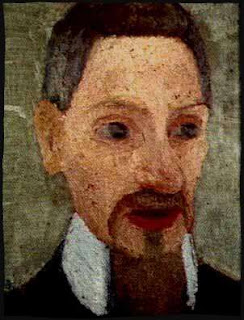
"The modest domestic circumstances of Tolstoy, the lack of comfort in Rodin's rooms - it all points to the same thing: that one must make up one's mind: either this or that. Either happiness or art. On doit trouver le bonheur dans son art [one must find happiness in one's art]: that too, more or less, is what Rodin said. And it is all so clear, so clear. The great artists have all let their lives become overgrown like an old path and have borne everything in their art. Their lives have become atrophied, like an organ they no longer use."
- Rainer Maria Rilke, in a letter to Clara Rilke, Sept 5, 1902.
Image: Modersohn-Becker's portrait of Rainer Maria Rilke.




So many examples of unhappy artists and for every one, a counterexample. And the other counter argument I've seen is to question whether artists are more unhappy than other people, or just have the ability to dramaticise their unhappiness.
ReplyDeleteIf you can find happiness in your art, you needn't choose between happiness and art.
ReplyDeleteMy question is, Is there happiness outside of art? Or some other passionate pursuit (e.g., teaching) that leads to self-actualization by diminishing self-absorption?
Happiness is in your heart, not your domestic circumstances. The real choice is between happiness and seeking happiness in palatial rooms, etc.
You both make good points.
ReplyDeleteIs art an intrinsic part of happiness, or a happy life? I'd say some form of creativity is intrinsic, but it may not manifest itself as art per se.
And yes, it's possible to find happiness in what you already have (access to). Seeking happiness via some external object(s) is doomed to failure.
Perhaps it becomes especially problematic for artists because it's possible to perceive the 'created object' as crossing over that threshold from 'what you already have (access to)' to an external object?
So long as the artist cultivates a sense of oneness, or what Buddhists call sunyata / 'emptiness', whereby no thing possesses self-identity, they may be able to overcome the ego-centric pitfalls of 'this is my creation, it belongs to me'?
Do we make art because we want to be loved, understood, forgiven? Do we make art because we suffer?
Nietzsche said that an artist should only be content in his bread and his art, panem et circenses. Some artists flagellate to create, I ache if I haven't written for a few days. I think foregoing luxuries does not mean forefoing happiness, and that one should be satisfied in one's art.
ReplyDeleteMark, I ache if I haven't written for a few days too. In fact, I'm in that boat at the moment. Looking forward to getting away next week and having some time to write...
ReplyDeletegreetings stu, great to see paula modersohn-becker's brushwork go digital here. the worpswede folk were a pretty interesting bunch.
ReplyDeletegerald murnane begins his 'barley patch' with a rilke statement about the necessity to write from 'letters to a young poet', a statement murnane wld annually share with his students, preparing? them with rilke's tough love advice. here it is:
"Nobody can counsel and help you, nobody. There is only one single way. Search for the reason that bids you write...acknowledge to yourself whether you would have to die if it were denied you to write. This above all – ask yourself in the stillest hour of your night: must I write?"
but here's an even more revealing statement from john zerzan, that i think is at the heart of the art/happiness question:
"Art, like religion, arose from the original sense of disquiet, no doubt subtly but powerfully disturbing in its newness and its encroaching gradualness...Culture has led us to betray our own aboriginal spirit and wholeness, into an ever-worsening realm of synthetic, isolating, impoverished estrangement."
john zerzan 'running on emptiness' feral house (2002)
numerous writers (mcluhan, graeber, debord) speak of widespread melancholy sweeping europe with the blossoming of the bourgeoise - art/property etc:
"The whole idea of detention in a closed space as a form of human punitive corrective action seems to have come in very much in the thirteenth and fourteenth centuries – at the time perspective and pictorial space was developing in our Western world".
marshall mcLuhan, the medium is the massage, penguin (1967)
just some thoughs(sic),
cheers,
p
Hi Patrick,
ReplyDeleteThanks for sharing those quotes. The Rilke one would be a great starter for a writing course.
The Zerzan quote makes me question whether art and religion stemmed from 'disquiet', or whether art and 'religion' (or ritual) were at one stage part of the 'wholeness' he mentions. In fact I wonder what he means exactly by this disquiet (although I can hazard a guess). I suppose I'll have to read the book to find out! Perhaps the 'disquiet' later became a driving force for maintaining art, ritual, magic, etc - but wasn't the original 'source'. I guess I'm thinking along the lines of ecstatic and revelatory states as the potential originators of art and religion per se, but perhaps I've just overdosed on Terence McKenna?
There's a radio interview with McLuhan available through UbuWeb, where he passionately outlines his ideas on the evolution of media, perception, etc. Worth checking out.